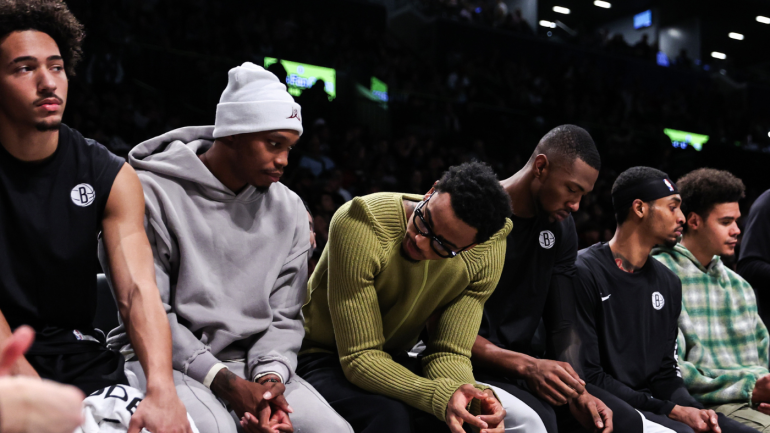
The undermanned Brooklyn Nets were a major underdog against the Milwaukee Bucks on Wednesday, but they played them competitively for a full period. After one quarter, Milwaukee held a meager 32-31 lead, and even when starters Mikal Bridges, Cam Thomas and Royce O’Neale went to the bench, Brooklyn managed to keep the game relatively close. The Bucks never led by more than 10 in the first three quarters. The Nets had a realistic path to a win a home contest that would have taken their record above .500. There was only one problem: their best players never returned to the game.
Bridges, Thomas and O’Neale all sat out the final three quarters of a game the Nets ultimately lost by 22 points, 144-122. The why of it is easy enough to explain. The Nets were playing the second game of a back-to-back. Teams frequently rest key players under those circumstances, but Brooklyn’s approach was rare by NBA standards. Instead of just sitting their players out entirely, the Nets decided to start them, give them one quarter of run, and then pull them out of the game early.
“My thought was getting a feel and pulse of the game,” Nets coach Jacque Vaughn explained after the game. “Mikal played 40 minutes [Tuesday] night and so the thought was it wouldn’t be wise for me to continue and go down this path and have him play 40 minutes again … I ran Cam, Royce, and Mikal pretty long in the first quarter. Just envisioned at the end of the night that I didn’t want them touching 40 minutes again. That’s really what it boiled down to.”
Before the game, Vaughn offered an alternative explanation for one of those three players. Bridges has never missed a regular-season game in his career. He entered Wednesday up to 422 consecutive games played. “He has a streak going on that he doesn’t want to end,” Vaughn said before facing the Bucks. Of course, neither Thomas nor O’Neale had such streaks to protect. Even if they did, Vaughn’s approach was unusual and controversial. Brooklyn was already missing several key players in Cam Johnson, Spencer Dinwiddie, Dorian Finney-Smith, Nic Claxton and Ben Simmons. By taking out Thomas, Bridges and O’Neale, they were effectively handing the game to Milwaukee, the league’s third-best team. Vaughn vigorously denied that implication, but Brooklyn’s loss wasn’t the real story of the game.
No, the real story here has far more to do with an element of the game that Vaughn isn’t paid to consider: the gambling and daily fantasy markets. Pulling starters for rest purposes in a close game in the middle of the season is almost unheard of in the NBA, but shrewd bettors who sniffed out the approach — which Vaughn himself hinted at before the game — could have made a killing. Perhaps more significantly, bettors will now have to weigh the risk of Vaughn replicating the strategy in similar situations moving forward. Doing so in the future is going to be even riskier. Vaughn isn’t going to tip his hand like he did with Bridges ahead of every back-to-back. There’s no way of knowing which games the Nets will take seriously, competitively speaking, and which ones they won’t.
Risk-averse books would surely prefer that the Nets either play their starters or sit them. If they are afraid of the Nets taking the middle ground that they took on Wednesday, that is going to be reflected in live lines. More importantly, it’s going to be reflected in props. How on Earth can a book set a point-total line when it doesn’t know if someone is playing 12 minutes or 36? The likeliest answer if this approach gains any sort of traction is that Nets props will simply be taken off of the board in their back-to-backs.
Might daily fantasy players take the opposite approach? Nets stuck deep on the bench are available for pennies, and a 21-point, 10-rebound night out of an unknown like Jalen Wilson can swing a contest. The same principle might even be true of starters. Perhaps Bridges is underpriced on certain nights for fear that he won’t play many minutes, and then winds up staying on the court most of the night.
For all we know, this could have been a blip. This is, after all, a strategy rarely employed in the NBA, and it might have been a circumstantial decision by Vaughn rather than any sort of coherent, long-term approach to managing minutes. But if this happens again, it’s going to force both sports books and daily fantasy outlets to respond to major lineup changes within games, and there just isn’t an easy mechanism for them to do that. That creates significant risk for players as well, but with significant risk comes just as much reward.